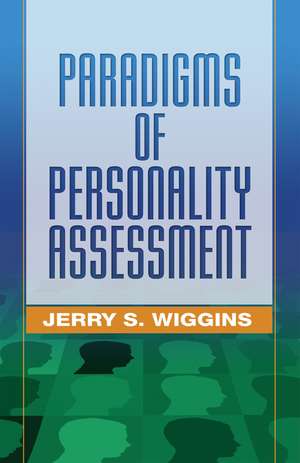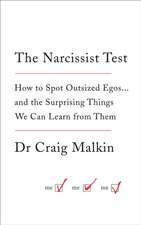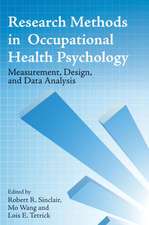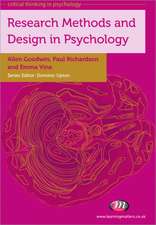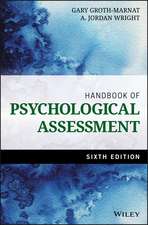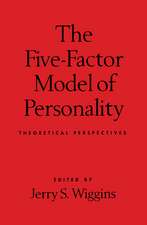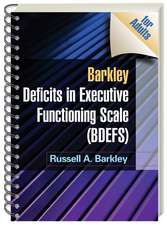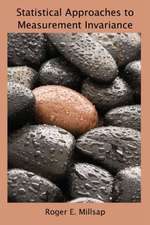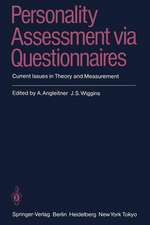Paradigms of Personality Assessment
Autor Jerry S. Wigginsen Limba Engleză Paperback – 17 noi 2005
From distinguished scholar and teacher Jerry S. Wiggins, this book is a uniquely integrative introduction to adult personality assessment that will engage graduate and undergraduate students alike. Part I thoroughly reviews five major assessment paradigms--psychodynamic, interpersonal, personological, multivariate, and empirical. In Part II, leading representatives of each paradigm are invited to interpret extensive test and interview data collected from a single subject. The resulting collaborative case study facilitates comparison of techniques, theories, and interpretations; illuminates the unique contributions of each paradigm; and suggests areas of common ground and potential integration.
| Toate formatele și edițiile | Preț | Express |
|---|---|---|
| Paperback (1) | 276.82 lei 6-8 săpt. | |
| Guilford Publications – 17 noi 2005 | 276.82 lei 6-8 săpt. | |
| Hardback (1) | 559.62 lei 6-8 săpt. | |
| Guilford Publications – 30 oct 2003 | 559.62 lei 6-8 săpt. |
Preț: 276.82 lei
Preț vechi: 291.40 lei
-5% Nou
Puncte Express: 415
Preț estimativ în valută:
53.00€ • 55.19$ • 43.98£
53.00€ • 55.19$ • 43.98£
Carte tipărită la comandă
Livrare economică 14-28 februarie
Preluare comenzi: 021 569.72.76
Specificații
ISBN-13: 9781593852610
ISBN-10: 1593852614
Pagini: 386
Dimensiuni: 152 x 229 x 27 mm
Greutate: 0.6 kg
Ediția:Revised
Editura: Guilford Publications
Colecția Guilford Press
ISBN-10: 1593852614
Pagini: 386
Dimensiuni: 152 x 229 x 27 mm
Greutate: 0.6 kg
Ediția:Revised
Editura: Guilford Publications
Colecția Guilford Press
Public țintă
Postgraduate, Professional, Professional Practice & Development, and UndergraduateCuprins
I. The Five Paradigms and Their Convergences
1. The Psychodynamic Paradigm
2. The Interpersonal Paradigm
3. The Personological Paradigm
4. The Multivariate Paradigm
5. The Empirical Paradigm
6. Convergences among Paradigms: The Individual and Society
II. A Collaborative Case Study
7. Personological Assessment, McAdams
8. Psychodynamic Assessment, Behrends and Blatt
9. Interpersonal Assessment, Pincus and Gurtman
10. Multivariate Assessment, Costa and Piedmont
11. Empirical Assessment, Ben Porath
12. Constructive Alternativism in Personality Assessment, Trobst and Wiggins
Appendix A. Thematic Apperception Test (TAT) Protocol
Appendix B 1. Rorschach Protocol
Appendix B 2. Rorschach Scoring
Appendix B 3. Rorschach Scoring Summary
Appendix C. Object Relations Inventory (ORI) Protocol
1. The Psychodynamic Paradigm
2. The Interpersonal Paradigm
3. The Personological Paradigm
4. The Multivariate Paradigm
5. The Empirical Paradigm
6. Convergences among Paradigms: The Individual and Society
II. A Collaborative Case Study
7. Personological Assessment, McAdams
8. Psychodynamic Assessment, Behrends and Blatt
9. Interpersonal Assessment, Pincus and Gurtman
10. Multivariate Assessment, Costa and Piedmont
11. Empirical Assessment, Ben Porath
12. Constructive Alternativism in Personality Assessment, Trobst and Wiggins
Appendix A. Thematic Apperception Test (TAT) Protocol
Appendix B 1. Rorschach Protocol
Appendix B 2. Rorschach Scoring
Appendix B 3. Rorschach Scoring Summary
Appendix C. Object Relations Inventory (ORI) Protocol
Notă biografică
Jerry S. Wiggins, PhD, has been contributing to the scientific literature in personality assessment for over 45 years. He has held faculty positions at Rochester University (1956-1957), Stanford University (1957-1962), the University of Illinois (1962-1973), and the University of British Columbia (1973-1996), where he is Emeritus Professor. He also served as an adjunct professor at York University. Widely published, Dr. Wiggins is well known for his construction of the original content scales for the MMPI and for his contributions to the development and validation of interpersonal circumplex models of personality. He is the author of the Interpersonal Adjective Scales (including the revised, Big Five version) and coauthor of the Inventory for Interpersonal Problems -- Circumplex. He has also served as an editorial board member and/or ad hoc reviewer for numerous psychology journals. In 2002, Dr. Wiggins was honored by the Society for Personality Assessment with the Bruno Klopfer Award for his outstanding, long-term contributions to the field of personality assessment.
Recenzii
This book articulates a vision of the theory and practice of personality assessment that will inform beginners and experts alike. Wiggins' portrayal of different traditions in the field highlights the goals and accomplishments of each approach, and successfully transmits the excitement and fascination with assessment that is characteristic of practitioners. This is not a 'how-to-do-it' text, but a thoughtful, scholarly, and readable consideration of central questions in assessment. Beginning students will find this volume a welcome introduction to personality assessment vivified by a multifaceted study of a single case; more advanced readers will find a coherent vision that integrates theory and practice. There is no comparable treatment of the scientific and practical foundations of personality assessment.--Daniel J. Ozer, PhD, Department of Psychology, University of California, Riverside
In this long-awaited book, one of the recognized giants of personality assessment has summarized the history and state of the art of five assessment paradigms. Wiggins' approach might be described as 'zealous eclecticism': his broad scholarship is infused with genuine enthusiasm for each paradigm. He offers a theoretical integration in a chapter on agency and communion, and has assembled a cast of experts to illustrate their methods in what will doubtless become a celebrated case history. This is an essential text for anyone who assesses personality. It is suitable for use in graduate-level clinical psychology courses, as well as personality courses for graduates and advanced undergrads.--Robert R. McCrae, PhD
This book is the mature work of a wise and gifted scholar and writer. It beautifully describes the essence of five approaches to personality assessment. From the opening pages, the reader is engaged--and rewarded--with a sympathetic yet balanced appreciation of each approach. Using his own rich personal experiences and his encyclopedic academic knowledge, Jerry S. Wiggins has provided numerous impressive insights into fascinating ideas and the people who generated them.--Leonard M. Horowitz, PhD, Department of Psychology, Stanford University
-In this long-awaited book, one of the recognized giants of personality assessment has summarized the history and state of the art of five assessment paradigms. Wiggins' approach might be described as 'zealous eclecticism': his broad scholarship is infused with genuine enthusiasm for each paradigm. He offers a theoretical integration in a chapter on agency and communion, and has assembled a cast of experts to illustrate their methods in what will doubtless become a celebrated case history. This is an essential text for anyone who assesses personality. It is suitable for use in graduate-level clinical psychology courses, as well as personality courses for graduates and advanced undergrads.--Robert R. McCrae, PhD
This book is the mature work of a wise and gifted scholar and writer. It beautifully describes the essence of five approaches to personality assessment. From the opening pages, the reader is engaged--and rewarded--with a sympathetic yet balanced appreciation of each approach. Using his own rich personal experiences and his encyclopedic academic knowledge, Jerry S. Wiggins has provided numerous impressive insights into fascinating ideas and the people who generated them.--Leonard M. Horowitz, PhD, Department of Psychology, Stanford University
Very much a must-read book for personality assessment specialists and their students....destined to become another classic and a want-to-read book for many psychologists.
--Canadian Psychology, 10/6/2005Descriere
From distinguished scholar and teacher Jerry S. Wiggins, this book is a uniquely integrative introduction to adult personality assessment that will engage graduate and undergraduate students alike. Part I thoroughly reviews five major assessment paradigms--psychodynamic, interpersonal, personological, multivariate, and empirical. In Part II, leading representatives of each paradigm are invited to interpret extensive test and interview data collected from a single subject. The resulting ""collaborative case study"" facilitates comparison of techniques, theories, and interpretations; illuminates the unique contributions of each paradigm; and suggests areas of common ground and potential integration.
